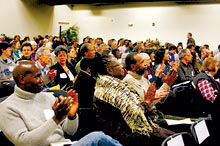Some 300 people gathered at UNC-Asheville’s Highsmith University Union on Feb. 16 for the second annual State of Black Asheville Forum, a daylong event featuring panel discussions about blacks’ experiences in education, employment, law enforcement and health care in Asheville. The event was started last year by UNCA political science professor Dwight Mullen.

Engaging in honest dialogue about the issues facing Asheville’s black population is half the battle, Mullen said during his opening statements. “But I promise you, good will come of it,” he added. “We’re dealing with truth.”
Those issues emerged in a series of presentations framed by statistics. In the employment segment, UNCA senior Rachel Williams reported that 32 percent of Asheville’s black residents are living below the poverty line. Meanwhile, Allen Johnson, superintendent of Asheville City Schools, noted that there has been an overall decline in enrollment, which he attributed to a rise in the local cost of living. “We’re finding that the cost of housing is so great, it’s becoming more unaffordable for families to live in Asheville,” he said.
In Asheville City Schools, during the 2005-06 school year, there were 195 suspension incidents involving white students and 1,129 involving black students, reported UNCA senior and political science major Jason Tuell. But thanks to a tutoring program in Asheville City Schools called Advancement Via Individual Determination (more commonly known as AVID), some African-American students are making strides in academic achievement, reported UNCA senior Zofia Wleklinski.
Gene Bell, chair of the Asheville City Schools Board of Education, spoke about “falling asleep at the switch,” and encouraged community members to become involved in the lives of at-risk youth. “We need to start embracing people, rather than alienating them,” he said.
During the law-enforcement presentation, UNCA student Courtney Langston—there as a proxy for her classmate, David Cox, who was ill—waged some serious criticism against the Asheville Police Department. As Police Chief Bill Hogan looked on, Langston delivered a PowerPoint presentation highlighting a need for greater transparency. She displayed photos of Antoine Peterson and Lacy Pickens, two African-American men who were fatally shot by Asheville police officers, and said the outcome of internal investigations resulting from those incidents were never released to the public. Finally, she criticized an under-representation of African-Americans in the city’s police force.
In response, Chief Hogan called police recruiting a “community responsibility,” saying that African-American men and women who opt to join the police force often do so courageously and despite the disapproval of their families and friends. As to the need for greater transparency, he said the APD is prohibited, by law, from sharing personnel records such as the results of internal investigations. Lt. Randy Sorrells of the Buncombe County Sheriff’s Office spoke in the place of Sheriff Van Duncan, who had the flu and could not attend. Sorrells assured the audience that the Sheriff’s Department is trying to partner with the community to address concerns. “We are a culture,” Sorrells said of local law enforcement. “And changing a culture is not an easy task.”



Before you comment
The comments section is here to provide a platform for civil dialogue on the issues we face together as a local community. Xpress is committed to offering this platform for all voices, but when the tone of the discussion gets nasty or strays off topic, we believe many people choose not to participate. Xpress editors are determined to moderate comments to ensure a constructive interchange is maintained. All comments judged not to be in keeping with the spirit of civil discourse will be removed and repeat violators will be banned. See here for our terms of service. Thank you for being part of this effort to promote respectful discussion.